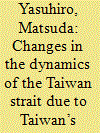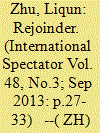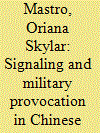|
|
|
Sort Order |
|
|
|
Items / Page
|
|
|
|
|
|
|
| Srl | Item |
| 1 |
ID:
177080


|
|
|
|
|
| Summary/Abstract |
The objectives of this paper are to elucidate Taiwan’s successful COVID-19 measures as well as the conditions surrounding the deterioration of Cross-Strait relations and to identify future prospects. The author has demonstrated the success of Taiwan’s Novel Coronavirus countermeasures and shown that China’s increasingly hardline policies toward the rest of the world and Taiwan in particular have contributed to unstable Cross-Strait relations. First, Taiwan’s successful anti-epidemic policies have done much to boost Taiwanese self-esteem. Second, within Taiwan, the majority view identified China as the source of the trouble, not the DPP. Third, with US–China relations deteriorating even further as a result of the Novel Coronavirus pandemic, the US began to actively “showcase” Taiwan’s success. Fourth, China’s Taiwan policy is expected to remain deadlocked for the time being. US–China relations are increasingly worsening, Taiwanese public opinion is trending toward increasing distance from China, and all that remains of China’s Taiwan policy is “placing hope on the mainland itself.” Thus, the Cross-Strait relationship is expected to continue deteriorating well into the future.
|
|
|
|
|
|
|
|
|
|
|
|
|
|
|
|
| 2 |
ID:
126452


|
|
|
|
|
| Publication |
2013.
|
| Summary/Abstract |
This rejoinder to Daniel Twining's article in the last issue (48:2, June 2013) of The International Spectator argues that both China and the United States recognise how important their relationship is for the world and the Asia-Pacific in particular. But the risk of tension on the security front has increased recently due to the US' policy toward maritime disputes that has actually involved meddling between the parties involved, and its 'pivot' to Asia which targets China with more military engagement in the region. The China-US relationship has never been an easy one with the US certain of its primacy and China proud of its glorious past, which almost makes a conflictual power transition a self-fulfilling prophecy. Management of the relationship is the key for both countries to bring about more cooperation and to rein in competition. Co-evolution, a new type of relationship among major countries, is the only way out, in which the logic of interaction is 'live-and-let-live' rather than mors tua, vita mea.
|
|
|
|
|
|
|
|
|
|
|
|
|
|
|
|
| 3 |
ID:
158729


|
|
|
|
|
| Summary/Abstract |
The dawn of the twenty-first century witnessed a new wave of multilateral initiatives in the Asia-Pacific. By integrating institutional balancing theory and role theory, the author proposes a new theoretical framework—‘balance of roles’—to explain the variations in institutional strategies by different states. It is argued that a state’s role conception will shape its institutional balancing strategies in an order transition period. An order defender, like the USA, is more likely to adopt exclusive institutional balancing to exclude its target from its dominated institutions. An order challenger, such as China, will choose both inclusive and exclusive institutional balancing to maximise its own power and legitimacy in a new international order. As a kingmaker, a proactive second-tier state is more likely to pick an inter-institutional balancing strategy to initiate new institutions for competing for influence with existing institutions. An institutionalised order transition might be more peaceful than widely perceived.
|
|
|
|
|
|
|
|
|
|
|
|
|
|
|
|
| 4 |
ID:
104332


|
|
|
|
|
| Publication |
2011.
|
| Summary/Abstract |
On 8 March 2009, five Chinese vessels shadowed and aggressively maneuvered in close proximity to the US Naval Ship (USNS) Impeccable. This paper seeks to explain the incident and its aftermath in the context of Chinese coercive diplomacy. China's strategy, designed to motivate the US to cease surveillance operations near its militarily sensitive areas in the South China Sea, included three components: (1) the use of military provocation, (2) a coordinated media campaign, and (3) a challenge to US interpretations of the United Nations Convention on the Law of the Seas (UNCLOS). This study goes beyond traditional research on Chinese use of force to explain why China's coercive diplomatic campaign took the form it did. Only by understanding the nature and factors affecting Chinese coercive diplomacy can the US design the effective counter strategy needed to protect US regional and global interests.
|
|
|
|
|
|
|
|
|
|
|
|
|
|
|
|
|
|
|
|
|